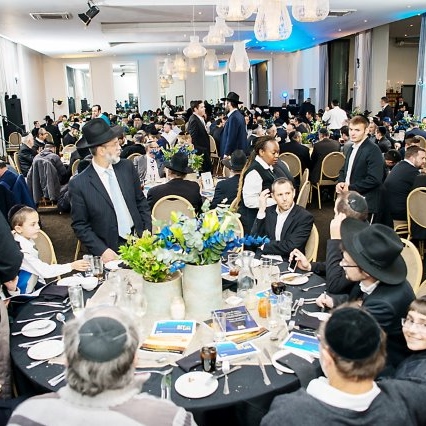click to dowload our latest edition
CLICK HERE TO SUBSCRIBE TO OUR NEWSLETTER


Published
7 years agoon
By
adminSIMON APFEL
More than 260 people were gathered together to celebrate the achievement of having traversed an entire volume of the Mishna Berura, and they’re upbeat not because – well, not just because – a vleishik smorgasbord awaits.
In addition to marking the completion of the first, encyclopaedic volume of the Chafetz Chaim’s halachic opus detailing the laws of living as a Jew, the Dirshu Gala Dinner is commemorating another achievement – South African Chief Rabbi Warren Goldstein’s completion of all 2 711 pages and 37 tractates of the Babylonian Talmud over the course of 27 years.
“This is a personal celebration for the Chief Rabbi, but also a communal celebration,” said Dirshu head Rabbi Aryeh Taback. “There was a time when we were perceived as a ba’al t’shuva community – a community of upstarts – but we have now also become one of real Torah achievements and aspirations. And it’s a tribute to the community that our Chief Rabbi typifies such achievements and aspirations.”
At a similar event in Cape Town a week later, Rabbi Dani Brett, who heads up the “Torah City Wide” stable of learning programmes, echoed these sentiments. But the Chief Rabbi’s Siyum HaShas wasn’t the only Talmudic feat on display that evening.
Rabbi Arran Cohen is one of only a few hundred Torah scholars worldwide left standing in Dirshu’s extraordinary Kinyan HaShas programme. The participants cover the entire Talmud over a seven and a half-year period, learning a daf (one double-sided page of Talmud) a day. What distinguishes this from the usual Daf Yomi programme, however, is the process of rigorous assessment to which they voluntarily subject themselves.
Rabbi Cohen recently sat a (closedbook) test in Jerusalem on 1 700 pages of brain-meltingly dialectical, unfathomably complex discussions on Jewish law. The Talmudic equivalent of doing Iron Man fulltime, it’s a feat one observer described as “supernatural”, and another deemed simply “impossible”, and it’s difficult to argue with either of those assessments.
Amid the celebrations, however, the evening has a solemn note. It’s a video on the life of the Piaseczna Rebbe, accompanied by the haunting acapella chants of local duo “Derech Achim” (MTV this isn’t). Orphaned at three, the prodigious Piaseczna (Kalonymus Kalman Shapira) was appointed spiritual leader of his Polish town at the age of 20, built one of the biggest yeshivas in Poland, and then perished, along with most of his family, in the Holocaust – only to “rise from the grave” three years later when his extraordinary Chassidic masterwork, Eish Kodesh (“The Holy Fire”), was discovered in a canister beneath a slab of paving in what was the Warsaw Ghetto. Today, Eish Kodesh is a staple in Chassidic yeshivas the world over.
In many ways, says Taback, the story of the Piaseczna Rebbe – of illumination born from the embers of the Holocaust – mirrors the story of Dirshu itself: “A young man and woman meet in the displaced persons’ camps of post-Holocaust Europe and unite in marriage. They make their way to Canada and start to build a family and a livelihood.
“A few decades later, their small property business has become a real estate empire and their family a Jewish dynasty. In 1997, one of their offspring, a young man by the name of Dovid Hofstedter plants a seed – a Gemara shiur he presents for working men in the heart of Toronto.
“Twenty years later, that shiur has grown into Dirshu – perhaps the largest organisation dedicated to promoting and supporting Torah study in the history of the Jewish people.”
Rabbi Hofstedter himself cuts an intriguing figure. The quiet patron of Dirshu runs a multi-billion dollar business empire, overseeing 90 million square metres of real estate, yet the majority of his time is spent on Torah learning (he is the author of the acclaimed Dorash Dovid, a series of in-depth essays on the Chumash and festivals) and on running Dirshu.
Hofstedter first brought Dirshu to South Africa in 2012, but things only really took off in 2014 with the launch of the organisation’s flagship Mishna Berura Halacha programme. Today, daily shiurim are hosted in scores of shuls and communities, while more than 100 000 online shiurim have been listened to on the Dirshu website, and the monthly halacha tests have become a fixture on the Johannesburg and Cape Town community calendars.
But for Taback, it goes beyond mere practical knowledge. “The Dirshu Dinner is a celebration of the remarkable commitment of Jews from all walks of life to carve time from overwhelmingly busy lives to connect to Torah and to connect to G-d. This, I believe, is the ultimate secret of Jewish eternity and invincibility.”
